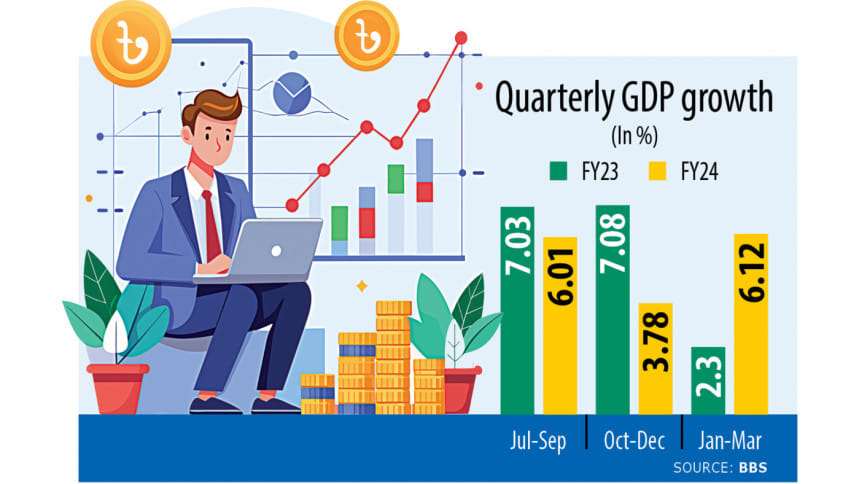GDP growth tops 6% in third quarter

Bangladesh's economy bounced back by posting significantly higher growth in the third quarter of fiscal year 2023-24 compared to the same quarter in the previous year, underlining good progress in the production of industrial goods and agricultural commodities.
The country registered 6.12 percent growth in the gross domestic product (GDP) in the January-March period in FY24, a considerable increase from 2.3 percent in the same period of FY23, according to provisional data released by the Bangladesh Bureau of Statistics (BBS).
In the October-December quarter of FY24, GDP growth stood at 3.78 percent.
The BBS also projected that Bangladesh's economy would grow by 5.82 percent in FY24.
"This spike in growth in the third quarter was expected," said Ashikur Rahman, principal economist at the Policy Research Institute of Bangladesh.
This is a reflection of the political stability after the general elections in January this year, he said.
In the second quarter of FY24, the political situation was in a vulnerable spot. So, businesses shied away from investment while public investment was also stagnant.

But in the third quarter, public and private investments found renewed impetus.
Echoing those sentiments, Binayak Sen, director general of the Bangladesh Institute of Development Studies, outlined three additional factors that had contributed to growth -- better Boro production and higher remittance and export earnings.
"The Boro paddy output was better than the Aman season and it has met the shortage of Aman production," said Sen.
Additionally, a handsome amount of remittance was received ahead of Ramadan and Eid-ul-Fitr, he added.
"Compared to the previous quarter, the trend was better in the third quarter, which might have helped boost growth. But we cannot definitively say that it jumped to 6.12 percent from 3.78 percent," he said.
The BBS can give the right explanation, he said.
The industrial sector, which accounts for around 33 percent of the GDP, grew by about 7.03 percent in the January-March quarter of FY24 compared to 4.98 percent in the same period a year prior.
Besides, the services sector, which encompasses trade, transport, hotel, IT, and financial activities, drove the overall growth of the GDP.
The growth in the services sector, which accounts for 53 percent of GDP, increased from 1.47 percent to 4.97 percent in the same period.
Similarly, growth in the agriculture sector increased from 1.88 percent to 5.46 percent.
However, noted economist Debapriya Bhattacharya said that data discrepancies may have also contributed to 'suspect' figures in the BBS' quarterly GDP growth data.
A stark discrepancy in data was highlighted recently when the Bangladesh Bank published the corrected export data as part of its balance of payments (BoP) and detected around a $14 billion gap between national shipments and actual receipts.
"The GDP growth figures have been suspect for quite some time," Bhattacharya said.
This is because the proxy indicators of GDP growth, such as private investment, credit flow, import of capital machinery and use of energy, do not align with the overall economic performance, he added.
Even the latest mid-term macro framework indicates such misalignment, he said, adding: "We hoped that the introduction of quarterly GDP growth estimates would partly address this problem. However, the misalignment with the proxy indicators continues."
The January-March quarter had been depressed not only in terms of investment but also consumption - depriving the economy of required growth impetus, said Bhattacharya, also a distinguished fellow at the Centre for Policy Dialogue, a think tank.
The recent conundrum with the export data indicates the depth of the problem. "Indeed, it is time to form an independent Statistical Commission to streamline the national income estimates as well as other concerned indicators such as private investment and employment," he said.
As a matter of fact, the credibility of official data will have enhanced importance during the economy's transition to its next stage.
"Thus, we should not underplay the importance of real-time, credible official data," he said.

 For all latest news, follow The Daily Star's Google News channel.
For all latest news, follow The Daily Star's Google News channel. 







Comments